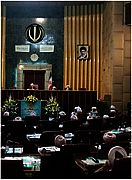More Praise of the Leader?
» Special Session of the Leadership Experts:
The presiding board of Iran’s Assembly of Experts on Leadership met last week to determine a specific date for the next formal gathering of the council that meets twice a year to - in theory - review the work of the leader. At the conclusion of the three earlier gatherings of the 86-member clerical assembly, the official statement praised ayatollah Khamenei for “wearing the mantle of leadership of the Islamic nation.”
Members of the presiding board comprising of seyed Mahmoud Hashemi Shahrudi, Mohammad Yazdi, Sadegh Amoli Larijani, and Ibrahim Reisi met at the current chairman Hashemi Rafasanjani’s office and agreed to convene the ninth gathering of the assembly on March 15 and 16 this year. It was also agreed that prior to the official opening of the assembly, a joint session would be held to include the members of the presiding board and 5 selected members from the assembly plus the heads of the various committees of the council. This preliminary meeting is scheduled to meet in January.
This preliminary meeting is a first in the history of the body and neither the secretariat of the assembly nor any of the assembly members commented on this preliminary meeting.
The Duties of the Experts of the Assembly
According to article 107 of Iran’s constitution, the selection of a leader, after ayatollah Khomeini was “recognized and accepted as the leader by the absolute majority of the people,” rests with the Assembly of Experts. The constitution provides that the experts would consider every qualified cleric and elect the one who is considered to posses the clerical, political and social qualifications mentioned in section 5 and article 109 of the constitution. Otherwise, the provisions outline, one of them will be presented as the leader. The provisions specifically also say that the leader is equally accountable to the laws of the land, like other citizens of the country.
Article 111 of the constitution provides that should the leader be incapacitated to carry out his duties or lack the qualifications mentioned in article 109, he shall be removed from office, which is determined by the experts referred to in article 108. The writers of the constitution had also thought of the possibility of the need to remove a leader and provided that in case of death, or removal of the leader, the experts had the responsibility of taking steps to determine and present a new leader.
Three Sessions of Praise
At the end of the last three sessions of the assembly, held after the troublesome 2009 presidential elections when there much criticism of the ayatollah Khamenei as the leader from the senior ayatollahs, political groups and even some members of Iran’s parliament the Majlis, the members of the assembly issued statements only praising the leader.
In September 2009, as massive protests over the 2009 presidential elections were raging in the streets of Iranian cities and towns, the assembly met and issued a statement praising ayatollah Khamenei and congratulating Mahmoud Ahmadinejad as president. The praise included words of “wise” measures by the leader to suppress the “fire of the sedition.” During that meeting, ayatollah Ali Mohammadi Dastgheib, representative from the city of Shiraz at the assembly, criticized the performance of ayatollah Khamenei. The chairman of the assembly, ayatollah Rafsanjani, left the final gathering when the final communiqué praising Khamenei was read out.
In the next gathering of the assembly, the “experts” again praised Khamenei for his leadership in suppressing the popular post-election protests that were carried out by the military and security agencies of the Islamic republic. The final communiqué also thanked the armed forces and security agencies for their role in suppressing the protests.
In the last session of the assembly, the meeting began with Rafsanjani’s criticism of the conditions in the country where he also said, “Violating the law means despotism, dictatorship, and unilateralism.” In this session, ayatollah Dastgheib was absent and the final communiqué did not mention the protests limiting its praise to pledging allegiance to the leader and calling his leadership and management “outstanding.”
Criticism of the Leader
The announcement that a special preliminary meeting of the Assembly of Experts will be held comes at a time when verbal attacks on Rafsanjani, Dastgheib and other critics are on the rise by the hardline press affiliated to the current administration and ruling circles.
But criticism of the leader continues as well. On Monday last week ayatollah Dastgheib once again reiterated his complaint and said, “All we are calling for is for the fulfillment of the very constitution that people have approved, which will make people happy and the Islamic republic will become stronger, as will the power of Shiism in the world.” He went on to say that no senior ayatollah or mujtahid today was happy with the state of affairs in the country because they are against the Quran, tradition and the constitution. In an earlier letter Dastgheib had supported the demands of the public and questioned whether the assembly had carried out its duties and said the three branches of government had been violating the constitution. At the sixth meeting of the assembly, Dastgheib had openly criticized the performance of his peers at the assembly and the leader.
Another influential cleric and former Speaker of the Majlis who is now among the leaders of Iran’s Green movement, Mehdi Karoubi, had also criticized the work of the assembly in a letter to its chairman Hashemi Rafsanjani and asked whether what was going on in the country was religiously sanctioned and whether government actions were constitutional.
Iran Participation Front, an influential party had also called for the establishment of an investigative committee to look into the violations committed by organs operating under the supervision of the leader, an indirect reference to the Assembly of Experts.


